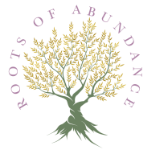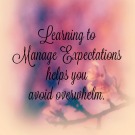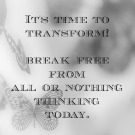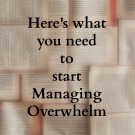We all love our guilty little pleasures, moments where our attention wanders and we clandestinely check out our news feed or send a quick text to someone. We fall down internet rabbit holes or become obsessed with binge watching our favorite online show. And while these little moments can often amount to nothing (minus the binge-watching which isn’t a moment at all but a marathon), they often can lead to something, and that something is the cost of distraction and possibility a fall into addiction.
Let’s Talk About the “A” Word
Dictionary.com defines addiction as:
The state of being enslaved to a habit or practice or to something that is psychologically or physically habit-forming, as narcotics, to such an extent that its cessation causes severe trauma.
Addiction goes far past indulging in a distraction and can lead to disastrous consequences on every level of a person’s life. Addiction bankrupts people; emotionally, mentally, physically, financially, and spiritually. It reaches far past a fun little dip into what was once a harmless pleasure.
It is safe to say that many of us operate now in a world where we have borderline to full-blown addictions to our technological devices. If we apply the definition of the word addiction to our behavior, we may well see that if we remove time spent on those devices, we will experience serious trauma such as severe anxiety and all-out panic attacks.
Why We Love Our Distractions
One of the hidden and yet very real reasons we love our distractions is that when taken to extremes, they allow us to sidestep issues that cause us pain. Don’t want to have that tough conversation with your spouse about something? Stay on social media. Don’t want to choose healthier habits to manage stress at work? Lose yourself in one self-help book after another and then never implement any of the suggestions in the books.
We love many of our distractions because they allow us to avoid, deny, procrastinate, and otherwise stay where we are, in a state of sometimes miserable comfort because we either don’t know what the root of our issue really is, or we lack the confidence we feel we need to make a real change.
The True Cost of Distractions
There is no time like the present, and once it’s gone, it’s gone forever. Living in a constantly distracted state robs us not only of our ability to do good work and stay productive, but it also robs us our valuable time and energy. We can gain more energy each night by sleeping, but as for time, when it’s gone, it’s gone; there is no magic rewind button on life.
As distractions rob us of our time and energy, they also subtly rob us of our self-respect and self- esteem. We often feel as though we are out of control; we are the one being dictated to either by a menacing clock, a buzzing phone, or an unrealistic sense of dread about how we’ll never be able to accomplish all we need to in the time allowed.
The real cost of distraction goes beyond productivity, time, and energy
because distraction convinces us that we are not in control.
Nothing could be further from the truth.
Reclaim Your Influence through Honesty
There are three questions you can ask yourself to instantly regain your influence over your precious time and energy:
Q1: What is this distraction costing me?
Ask yourself this question and answer honestly from a place of no judgment. If you notice you’re spending too much time doing something that allows you to avoid a bigger issue in your life, the worst thing you can do is beat yourself up. Notice you are distracted, note what you’re avoiding and move on.
Q2: If I say “yes” to this distraction, what am I saying “no” to?
Answering this question can be tricky because everyone has the line of “enjoying my guilty little pleasure” vs. “wow I just lost three hours of my life, and it passed by in a snap!” If you continue to engage in your distracting behavior what have you missed? Better relationships with others by being present and engaged? A better relationship with yourself? A tough conversation you need to have but are dreading? When you say yes, you ultimately say no to something else. Be curious about what you’re saying no to again without judgment, guilt, or shame.
Q3: What could I be doing instead that would move me toward my goals?
We all have things we want to accomplish in life, and by avoiding, denying, procrastinating, and otherwise spending valuable time on distractions, we end up feeling worse because we feel like we’re not making progress. This again boils down to how this distraction is rewarding you; if that reward is greater than your goals, you may be back in avoidance and denial land instead of making a plan on how to tackle a small first step toward that goal.
How to Hack Distraction
Frequently we are not in direct control of things we find distracting. Noisy and disruptive work environments, pesky coworkers, pinging emails, and frequently buzzing phones all test our patience and our focus. By answering the following questions, you can minimize distractions and improve attention span.
- What distractions do you have 100% control over?
- Time on your phone (text messages, calls, internet surfing, etc.)
- Time on tablets and larger devices (Netflix bingeing, etc.)
- Apps you can install to track time spent online
- Processes you put in place to manage work IM’s / emails/ phone calls
- How you engage with and respond to others
- How can you minimize external distractions?
- Set boundaries with yourself and others around your time by having kind but clear conversations about the specific distractions you’d like to minimize
- Purchase and wear noise canceling headphones
- Organize and keep your workspace clear of clutter (visual clutter can increase stress and prove frustrating when you’re trying to find something)
- Take short breaks to stand up, stretch, take a short walk, and drink some water
- Practice deep breathing exercises such as 16 count breath (inhale for four counts, hold for four counts, exhale for four counts, hold for four counts) to calm your nervous system
Reward Yourself and Be Vigilant
Remember, you have the power to decrease distraction in your life by starting small, getting specific on what you need to reduce, and then rewarding yourself for progress. A great way to start is by first figuring out what your key go-to distractions are and more importantly, how they reward you emotionally. Once you know your go-to’s and your rewards, you can figure out how to feel that same emotional reward by engaging in different behavior.
Getting clear on why you want to change is also vital in making progress and maintaining momentum. Without a clear why, you can fall back into habits you’re trying to break. Your why should be specific and should always include an emotion; we behave the way we do to feel a certain way so be sure the feeling you’re aiming for is strong enough to help keep you moving away from old tendencies and toward new ways of thinking and living.
Lastly, aim for balance; how can you indulge in your guilty pleasures without going overboard? How can you make a small, smart habit change without going cold turkey? I’d love to know how you’ve managed to minimize distractions so leave me a comment below.
Technology addiction can become a serious problem. Additional resources on how to get help can be found here.
https://virtual-addiction.com/
https://www.addiction.com/addiction-a-to-z/technology-addiction/technology-addiction-treatment/






